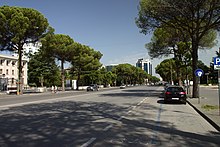You can help expand this article with text translated from the corresponding article in German. (October 2020) Click [show] for important translation instructions.
|
The Dëshmorët e Kombit Boulevard (English: Boulevard of the Martyrs of the Nation) is a major thoroughfare in Tirana, Albania. It was initially designed by Armando Brasini in 1925. Brasini's master plan was later amended by Florestano di Fausto, and in 1939 by Gherardo Bosio following the Italian invasion of Albania.
 View of the Boulevard looking northward. | |
| Type | Public Boulevard |
|---|---|
| Length | 1 km |
| Location | Tirana |
| From | Skanderbeg Square |
| To | Mother Teresa Square |
| Construction | |
| Construction start | 1939 |
| Completion | 1941 |
The wide thoroughfare was initially named after King Zog,[1] and after the 1939 invasion was renamed Viale del Impero ("Avenue of the [Italian] Empire").[2] In 1934 to 1935, a bridge was built over the boulevard by Gjovalin Gjadri.[3] During the communist era in Albania, major parades regularly took place including on Liberation Day and International Workers Day.
Many buildings are located along this boulevard, including the Presidential Palace, the Prime Minister's Office, the Palace of Congress, the Rogner Hotel and the University of Tirana. The boulevard enters the city centre from the south and intersects with Bajram Curri Boulevard near the Rinia Park. It then becomes part of Skanderbeg Square and continues north of the centre to Zogu I Boulevard.
During communism in Albania and in the 1990s, the boulevard served as an important social landmark where locals practiced the nightly stroll, also known as xhiro from Italian giro.
The boulevard was immortalised by Edi Hila in a series of paintings titled Martyrs of the Nation Boulevard.[4]
Gallery
edit-
The view from the Pyramide
-
Old picture of Tirana's car-free main boulevard
-
View from the south end of Mother Teresa Square
-
The Prime Minister's Office building
-
The street in 2022
References
edit- ^ Ingrid Bleta (June 2010). "Influences of political regime shifts on the urban scene of a capital city - Case study: Tirana". Middle East Technical University.
- ^ Vickers, Miranda (1999). The Albanians: A Modern History. Bloomsbury Academic. ISBN 978-1-86064-541-9.
- ^ "Boulevard Deshmoret e Kombit Bridge (Tirana, 1935)". Structurae. Retrieved 2021-05-07.
- ^ "Edi Hila: Painter of Transformation - Announcements - e-flux". www.e-flux.com. Retrieved 2018-06-11.